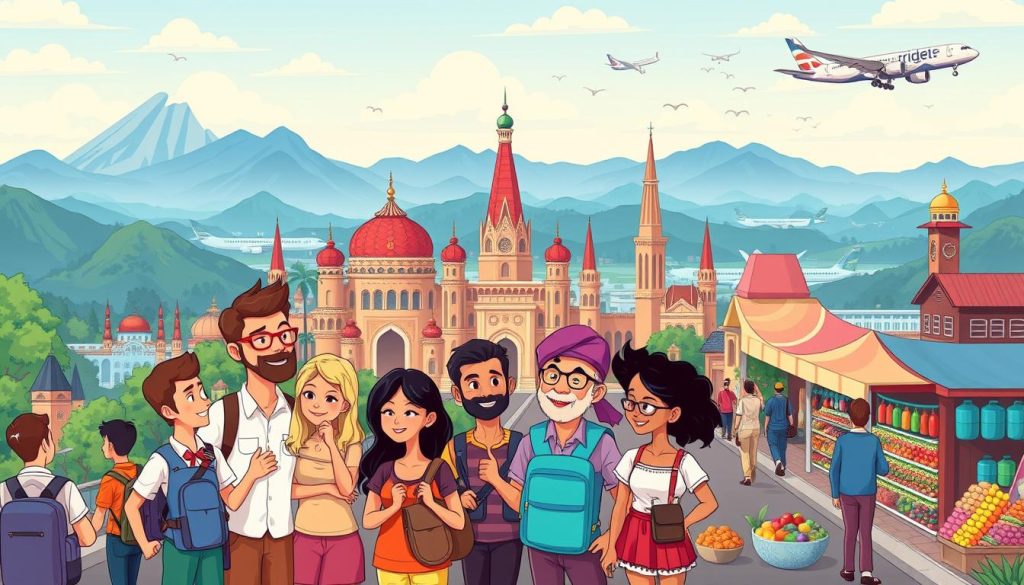Traveling abroad can be thrilling and broadening. Yet, it demands careful planning and preparation. This guide offers key travel tips to ease your journey. It covers everything from passport needs to managing money and culture shock. These tips will boost your confidence in navigating international travel.
Key Takeaways
- Booking a few days at a time can save on Airbnb fees1
- Prioritize accommodation value over seeking the best deals1
- Eat at local spots for better quality and lower prices1
- Negotiate tour prices for better deals1
- Prepare for potential payment challenges in Europe2
Start with Value Over Deals
When planning your budget travel, focus on the trip’s value, not just the price. Deals can be tempting, but choosing value over cost can make your trip more enjoyable and memorable3.
Focus on the Overall Value, Not Just the Dollar Amount
Think about the quality of your stay, how close you are to attractions, and the realness of your activities. A hotel or rental that costs a bit more but offers more amenities and a better spot might be a good choice. Be careful with very cheap tours or activities, as they might not offer the quality or realness you want3.
Accommodation Tips for Getting More Value
Looking for great value in your stay? Consider a vacation rental or Airbnb over a hotel. You’ll usually get more space and perks for your money. When booking, read reviews well and look at the location, property quality, and any extra fees. Booking a few nights at first lets you switch places if needed. Also, try negotiating with the owner or manager for a better price3.
Choosing value over the cheapest option means you’ll have a more fulfilling and memorable trip3.
“The best things in life aren’t things.” – Art Buchwald
Err on the Side of Kindness
When you travel abroad, it’s key to think about cultural etiquette and local customs. What’s okay in terms of personal space, social interactions, and travel manners can be very different from what you’re used to at home4. Don’t let a rude person or a tough situation ruin your trip. Instead, breathe deeply, be patient, and remember that most people will be kind and want to show you their culture4. Being open and respectful makes your trip better and more meaningful.
Think of yourself as a guest in another country. It’s important to respect the local ways and traditions4. Learn about cultural etiquette and travel manners before you go to avoid any misunderstandings4. Know about the cultural differences in eye contact, personal space, gestures, and nods, and change how you act to fit in4.
If you meet a rude person or a tough situation, step back and be kind and understanding45. Being calm and respectful can help calm things down and might even make things better5. Most people will want to share their local customs and help make your trip good.

By being open and respectful, you can easily handle the cultural etiquette and travel manners of your destination. This makes your trip memorable and enriching45.
“Treat others the way you want to be treated, even in a foreign land. A little kindness can go a long way.”
travel tips for international travel
Tips for finding authentic local food
Trying the cuisine of a new place is a great way to dive into the culture. Look for small, family-run places and street food stalls for the best tastes and prices6. Don’t just stick to places tourists go to. Explore a bit to find spots where locals eat. Remember, a clean kitchen doesn’t always mean good food. So, don’t be afraid to try new things. Learning about dining etiquette can also make your food adventures better.
How to handle food poisoning while traveling
Even the most careful traveler might get food poisoning or traveler’s diarrhea while abroad. Being ready and knowing what to do is key. Keep some over-the-counter meds and rehydration salts handy, and know where to find medical resources or pharmacies7. If you get sick, rest and drink plenty of fluids. Only leave your place if you have to, and get medical attention if things get worse or don’t get better.
“Sampling the local cuisine is one of the best ways to immerse yourself in a new culture while traveling.”

| Tip | Benefit |
|---|---|
| Seek out small, family-owned restaurants and street food vendors | Provides authentic and affordable dining experiences |
| Venture beyond well-known tourist spots | Find eateries frequented by locals |
| Familiarize with local dining etiquette | Make the most of your culinary adventures |
| Pack over-the-counter medications and rehydration salts | Be prepared to handle food poisoning or traveler’s diarrhea |
| Identify nearby medical resources or pharmacies | Know where to get help if needed |
Looking into your destination before you go can help you understand the local laws and customs6. Knowing the local money and language can make your trip better6. Tell your bank you’re traveling to avoid card problems6. Booking your travel and stay early can save you money and give you peace of mind6. Taking time to rest can make your trip more enjoyable6. Being careful about safety, staying in touch, and thinking about travel insurance can make your trip safer6.
The U.S. Department of State says to wait 7-10 weeks for passport processing, plus 4 weeks for mailing7. For a faster process, pay an extra $60 fee to get it done in 3-5 weeks7. You usually need a passport for international trips from the U.S7. Some credit cards offer travel benefits like accident insurance and lost luggage help7. Travel rewards cards can give you 2X miles on purchases and no foreign fees7. Looking at different places to stay like hotels, hostels, and home-sharing can save you money7. Travel insurance covers things like trip cancellations, lost bags, medical costs, accidental death, and flight accidents7.
Many airlines let you check in 24 hours before your flight8. Most places need a passport and visa to enter8. You might need proof of vaccination, a negative COVID test, and travel insurance8. Try to get to the airport three hours early, even for domestic flights8. Rules vary by country and airline8. Check what you can bring in your carry-on and checked luggage8. Airlines offer services like passport, visa, and medical document checks8. Consider upgrading your service or buying a local SIM card8. Talk to a doctor about any prescriptions and supplies you’ll need8. Register with your home country’s embassy8. Make sure you have an international driver’s license8. Know the rules for entry, testing, quarantine, masks, and distancing8. Websites like Fodor’s, TripAdvisor, U.S. Department of State, and Rick Steves are great for travel tips8. They cover emergencies, medical issues, and trip cancellations867.
It’s Okay to Indulge in Comforts from Home
Traveling abroad can be thrilling and broadening, but it can also affect your mind and body. It’s okay to take a break and enjoy something from home9. After all, 99% of travelers feel homesick at some point9. It’s normal to miss the comfort of familiar foods and routines after being in a new place for a bit9.
Whether it’s eating your favorite fast food, watching a favorite TV show, or just relaxing in your room, these comforts can help you feel better9. People can usually handle being away for about 8 weeks before they start missing their usual routines, like the gym, sleep, and work9.
There’s no shame in taking a break from exploring the local culture to enjoy something from home. In fact, it’s a good way to deal with the challenges of being in a new place9. Going home doesn’t mean you’ve failed at traveling9. It’s important to listen to your body and mind to stay well during your trip.
So, don’t hesitate to bring some comfort items or plan a nostalgic treat for yourself while traveling. It’s a healthy way to recharge and fully enjoy your journey.
Plan Ahead for Important Documents
Having the right travel documents is key for a smooth trip abroad. A valid passport is a must-have. If you need a new or renewed passport, apply early, as it can take weeks or months10. Kids under 16 get passports that last five years, so keep an eye on their expiration dates10. Many places also want your passport to be valid for at least six months before you arrive10.
Tips for Getting or Renewing a Passport
- Check the expiration date on your current passport and the entry requirements for your destination
- Apply for or renew your passport well in advance, as the process can take several weeks or months
- Be aware that passports issued to children under 16 are only valid for 5 years
Checking Visa Requirements and Travel Advisories
Many countries need visitors to get a visa before they can enter. Look into the visa needs for your destination, as they differ a lot. Some places offer e-visas or visas when you arrive, while others have a longer process11. You might also need to think about how you’ll get around when you arrive, with private transport often being best in some places11. Always check for any travel alerts or restrictions for your destination, as they can affect your trip10. Sign up at step.state.gov for updates on your destination’s travel and security10. Keep up with the latest from trusted sources, like government travel sites, for a worry-free trip.
Getting ready for your trip by having all your documents in order and knowing about visa needs and travel alerts can prevent delays or issues. Planning ahead lets you have a stress-free and fun trip abroad11.
Manage Your Travel Finances
Managing your money well is key to a great trip abroad. Start by looking into the best ways to use money there, like a travel credit card with no foreign transaction fees or getting local cash from ATMs12. Know about exchange rates and fees when you change money, and think about a bank account that lets you withdraw cash for free12.
It’s important to make a realistic travel budget to avoid spending too much and getting stressed. Include costs like where you’ll stay, how you’ll get around, what you’ll eat, and what fun things you’ll do to keep your spending in check13. Remember, planning your budget is not just for the trip itself; it’s also about keeping an eye on your spending and changing your ways as needed14.
- Learn about the local money and exchange rates to make smart choices about buying things and paying for them12.
- Think about a bank account or credit card made for travelers with no foreign transaction fees and free ATM use12.
- Make a detailed budget for things like getting around, where you’ll stay, what you’ll eat, fun activities, and souvenirs13.
- Keep track of your spending every day to stay aware of how much you’re using and adjust as needed14.
- Be ready to move money around if you face unexpected costs14.
| Expense Category | Typical Cost Range |
|---|---|
| Transportation | Airfare, car rental, gas, public transit, tolls, etc13. |
| Accommodations | Motels, hotels, Airbnb rentals, hostels, campsites, etc13. |
| Meals | Restaurant dining, street food, beverages, tips, etc13. |
| Activities and Entertainment | Sightseeing, tours, outdoor activities, shows, spa treatments, etc13. |
| Souvenirs | Local market prices, haggling, and currency considerations13. |
By managing your travel finances well, you can make sure your trip is fun and worry-free14.
Conclusion
International travel can be a rewarding and eye-opening adventure. It needs careful planning and preparation. This guide offers valuable tips to help you start a smooth and fun trip abroad15.
Think about the value of your trip, not just the cost. Be open to new cultures and enjoy comforts from home when you need them. With the right documents, money plan, and flexibility, you’ll enjoy your travels and make lasting memories16.
When you travel, remember to keep your data safe. Use secure Wi-Fi or VPNs, keep your devices updated, and be careful with your information on public computers1615. By keeping safe, you can fully enjoy the trip. You’ll get to experience new cultures, see amazing places, and grow as a person.
FAQ
What are some tips for planning an international trip?
Look for value, not just the cheapest deals, when booking your trip. Think about staying in vacation rentals or Airbnbs instead of hotels. And remember, cultural differences can make your trip better, so be open to them.
How can I find authentic local cuisine while traveling abroad?
Look for small, family-owned restaurants and street food stalls. Learn about local eating customs and manners. This will help you enjoy your food more.
What should I do if I get sick with food poisoning or traveler’s diarrhea while traveling internationally?
Bring over-the-counter meds and rehydration salts with you. Find the nearest medical place or pharmacy. Rest and drink plenty of fluids. If things get worse, get help from a doctor.
Is it okay to indulge in comforts from home while traveling abroad?
Yes, it’s okay to enjoy small comforts from home. It helps you recharge and prevents burnout. It’s normal to miss familiar things when you’re in a new place.
What important documents do I need for international travel?
Make sure your passport is valid and won’t expire soon. Check if you need a visa for your destination. Look for any travel warnings or restrictions. Start your visa application early to avoid problems.
How can I effectively manage my finances while traveling internationally?
Find out the best ways to use money in your destination. Use a credit card with no foreign fees or get local cash from ATMs. Make a budget for your trip to stay on track and reduce stress.

